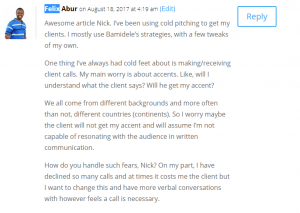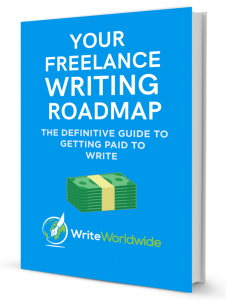Have you noticed?
Cold calling is still alive even though it’s been used by marketers for over 100 years now.
Is it still effective? Hell yes.
Compared to cold emailing, scheduling calls with prospective clients guarantees better results.
Today, in the freelance writing sphere, only a small percentage of writers pitch their services to companies using cold calls. This is despite the fact that cold calls are an efficient way to win business.
Why?
Because everybody is afraid of “not doing it right”, especially when you’re a non-native English writer.
Recently, WriteWorldwide reader Felix Abur posted the following comment on one of our posts…

As you can see, Felix is looking for tips to overcome fears about his accent and make successful cold calls with freelance writing prospects.
He’s not alone. Just a few weeks ago I was in the same position he is now.
I always dug my heels in and refused to arrange any Skype calls with clients.
Until…
I saw things a little differently. I put myself out there and embraced a “short-term discipline for long-term gain” mindset, despite my English pronunciation and expression issues.
Now you might be thinking “Well, you’re right. But my accent is totally incomprehensible — even if I had the courage to do cold calls, clients would hang up once they heard me talking.”
If that’s you, you should understand that there’s a solution to your problem…
How to Overcome Your Language and Accent Issues
Teaching yourself to speak English is a must before thinking of arranging cold calls. Let’s face it: unless the prospective client you’re calling is not a native English speaker themselves, you absolutely won’t land the gig if you can’t even use articles (a/an/the) properly or do not have a grasp of basic English grammar.
There are thousands of listening and speaking resources online to teach yourself English. In an answer on a Quora thread, entrepreneur Crowly Mathew Arackel advised joining IELTS and listening to BBC podcasts.

While the resources suggested by Crowly are great, the time you’ll need to spend to master English may differ depending on your English level and expertise.
For me, watching YouTube channels such as Easy English, One Percent Better, Practical Psychology, GaryVee, etc. was a key factor that helped me improve my English accent and speaking skills.
FluentU has put together a great resource on how to improve your English pronunciation in 8 steps. You can use this guide to pay close attention to your accent by learning more about how to track and correct your pronunciation issues.
Now that your English is good enough to talk to clients, you’re all set to start cold calling. Here are a few practical tips you can use to cold call successfully…
How to Cold Call Successfully When English Isn’t Your First Language
1) Make Your Words Count
Throwing a bunch of random answers and options at your client can ruin everything.
In some of my calls, my prospective clients had to reform questions after I kept giving them incomprehensible, broad answers that I didn’t think of even for a second. Total babbling.
It was more of a cooked spaghetti approach; throwing a bunch of spaghetti against the wall and seeing what sticks — which is wrong, by the way.
From the beginning of the call, you’ll need to acclimatise the prospect to a slow speaking rhythm. This will give you more room later for thinking of answers and ideas that will help the prospect, and land you the gig.
2) Take Control
A few months ago, WriteWorldwide co-founder Nick Darlington posted an article on how to manage freelance writing clients before they manage you.
Throughout the introduction, Nick mentioned several problems you might encounter if you allow your clients to control you (i.e. sending you an article on Friday that’s due Monday with no regard for your weekend.)
Cold calling is your first one-to-one interaction with a prospect. The impression you leave will determine how clients relate to you in the future.
My attitude towards this consists of positioning myself as a business owner who is interested in partnering with businesses rather than working for them.
In my first cold call — which felt like a job interview — my prospective client kept interrupting me and asking me useless, filler questions. Guess why? Because I let them dictate things in the first place, as I gave them control of the interview.
According to wikiHow, speaking slowly will also help you judge where to place the strong or weak stress in a sentence.
3) Listen Twice, Speak Once
The United States Department of Labor Secretary’s Commission on Achieving Necessary Skills (SCANS) identified three foundation skills that are crucial for those entering the workforce. Listening skills were among the necessary foundation skills SCANS listed.
Writers who listen to their clients and pay close attention to details always win. This habit allows you to show your interest in your client’s project and helps you see things with a clear perspective in mind.
Good listening can be achieved through remaining silent while the speaker is talking and helping them think of new ideas based on the needs they express.
4) Record Your Calls
Note taking while talking and listening to your client can be hard, and it might result in you missing critical information.
That’s why you need to record your calls — and you don’t need to be a techie to do this.
In fact, you can even use your laptop voice recorder or launch a video or audio recorder on your phone.
Personally, I use Camtasia Studio (a screen recording desktop software) to record my calls. I highly recommend it as it allows you to edit the tape and change its format.
Wake Up and Start Cold Calling
Although it’s challenging, cold calling is a fantastic experience.
You’ll have a great sense of accomplishment watching your first cold calls and comparing them to your recent ones.
Of course, you’ll still need to learn many other techniques on how to cold call. But most of them will come along the way while you practice cold calling.
The most important thing is to start.
If you’re going only to implement one idea from this article, it’d be to start your cold calling journey off without waiting until you perfect every skill.
Because trust me, you never will unless you do actually cold call.
Let’s get rolling!
Please share below if you have a tip to share or a question about cold calling as a non-native English writer.




I am afraid I won’t understand native English. When I watch youtube videos where people talk in formal English, I can understand sometime. But when I try to listen informal, fast conversations, I found it hard to understand. It’s annoying to tell client “I can’t understand” or “repeat please” after every sentence he told. Also, different people has different voice, that’s also a problem you know. English talks in formal news or presentations are much different than talking with people in real life. So what is your advice on that?
Hey Kamal,
From your comment, I can assume that you lack English listening skills. If you are incapable of understanding fast conversations, you need to listen to more of those and practice them. After I noticed I had this problem, I was able to solve it in about one year by listening daily to YouTube videos like etthehiphoppreacher’s.
I hope this helps.
Best,
Yassir
Hi Yassir,
Where could I get the hang of Bamidele’s scripts (or strategies)?
Hi Oscar,
A simple Google search would reveal that information. Alternatively, read this: https://writeworldwide.com/become-a-well-paid-freelance-writer-a-proven-blueprint/
Cheers,
Nick